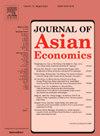转型经济中的家庭背景与代际流动:来自中国的证据
IF 2.9
3区 经济学
Q1 ECONOMICS
引用次数: 0
摘要
本文建立了一个不完全信贷和就业市场的解析模型,在该模型中,家庭背景有助于儿童投资教育和找到工作。由于一些缺乏社会关系的有能力的儿童被好工作拒之门外,他们投资教育的动机和机会都会减少。重视教育而非家庭背景的转变过程与更高的相对流动性、向上流动性和流动预期相关。要促进发展中国家的代际流动,除了为贫困儿童提供更多的教育机会外,就业市场的改革可能是另一个关键领域。中国的一些证据支持这一理论模型。本文章由计算机程序翻译,如有差异,请以英文原文为准。
Family background and intergenerational mobility in a transition economy: Evidence from China
This paper develops a parsimonious model of incomplete credit and job markets in which family background helps children invest in education and land jobs. As some competent children lacking in social connections are shut out of good jobs, both their incentives and accessibility in investing in education reduce. The transition process to value more on education rather than family background is associated with higher relative mobility, upward mobility, and mobility expectations. To promote intergenerational mobility in developing countries, the reformation of the job market may be another key area besides providing more education opportunities for deprived children. Some evidence from China supports the theoretical model.
求助全文
通过发布文献求助,成功后即可免费获取论文全文。
去求助
来源期刊

Journal of Asian Economics
ECONOMICS-
CiteScore
4.70
自引率
9.40%
发文量
90
期刊介绍:
The Journal of Asian Economics provides a forum for publication of increasingly growing research in Asian economic studies and a unique forum for continental Asian economic studies with focus on (i) special studies in adaptive innovation paradigms in Asian economic regimes, (ii) studies relative to unique dimensions of Asian economic development paradigm, as they are investigated by researchers, (iii) comparative studies of development paradigms in other developing continents, Latin America and Africa, (iv) the emerging new pattern of comparative advantages between Asian countries and the United States and North America.
 求助内容:
求助内容: 应助结果提醒方式:
应助结果提醒方式:


